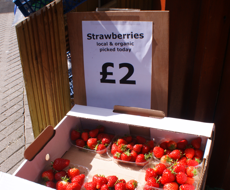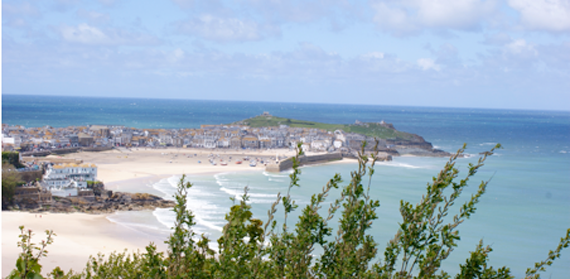The town of St Ives, Cornwall
Professor Marylyn Carrigan, Centre for Business in Society
The town of St Ives, Cornwall recently hit the headlines when it announced a vote to ban the construction of second homes – new build holiday housing – in the town, as a move to address some of the challenges of the shortage of affordable housing in the local area and the huge influx of tourists it hosts each year. The issue shines a light on some of the more challenging aspects of being a successful tourist destination. St Ives is a natural beauty spot that attracts thousands of tourists, famous for its large population of resident artists over the years such as Barbara Hepworth and Ben Nicholson, and now the celebrated St Ives Tate. The town is responsible for Cornwall’s second largest visitor spend, and is unique in the presence of a high number of independent shops and restaurants offering high quality goods and services.
What is perhaps less well known about St Ives is the informal network of local food growers, producers, retailers and restaurants that form the backbone of a sustainable food industry that has a valuable impact on the economic, social and environmental wellbeing of the town and surrounding area. We conducted a study of the town’s food businesses – including restaurants, food stores, bed & breakfasts – and what emerged were fascinating stories from a quiet but dedicated group of local food champions, who were as passionate about preserving the integrity of the local area as they were about running a business that supported their local community.
These are the findings we aim to present at our upcoming ESRC Festival of Science event ‘Leading Locally: Sustainable Food Tourism in St Ives” on the 10th of November 2016 from 2 to 4pm at the Farmers Market, Guildhall, St Ives, TR26 2DS, alongside Ed Hamer, an expert in community agriculture, and Tom Bouget of ODE true food, a sustainable food champion and small business owner.
The experience of small business owners in St Ives highlights the complex and subtle nature of the socially responsible strategies used to progress sustainability in this tourist destination. The findings show that these local businesses are catalysts for common good, often motivated by intrinsic not just extrinsic rewards, as one owner explained:
We are passionate about the town. …I certainly want to support local industry, local people… I have nine waitresses…they’re all local …we give young chefs the opportunity to showcase their talents …to do a night of their own… and cook what they want to cook…
The businesses’ principles and values collectively drive disruptive social change upstream and downstream in the tourist food supply chain. As one shop explained:
…there’s an organic farmer… I’ve worked with him and I’ve helped him in terms of… his planting and seasonality to extend his season and I basically take all he can produce… that’s a really strong partnership.
This support for ethical and sustainable food production and consumption has considerable impact and influence on local tourism, and the business owners have a strong sense of destination ownership which fuels an obligation to protect their fragile tourist resources while they strive for business success and provide and secure local jobs. As one café owner put it:
I don’t think I’m doing it for the good of the world. I kind of feel like I’m doing it for the good of the people buying this lovely local produce …getting the local economy to support itself and keep people employed and working.
The businesses recognise the fine balance between successful tourism and exploitation of the local area, and the challenges of what is a low wage economy in a former poor fishing village that now has London housing prices. Their experiences also highlight the tensions and conflicts in sustainable tourism when located in an environment that is inherently unsustainable for modern tourist trade. As one owner put it, Cornwall is potentially “killing the goose that laid the golden egg”.
What we found is that the problem of impending ‘peak’ tourism caused by visitor numbers is increasingly stretching environmental, social and economic resources. This is driving many of the food businesses in our study to practice food tourism that increasingly aligns to the principles and opportunities that sustainable tourism represents, rather than prioritising merely maximizing profit and visitor numbers.
To find out more about our research and sign up for the ESRC Festival of Science event ‘Leading Locally: Sustainable Food Tourism in St Ives” on the 10th of November 2016 from 2 to 4pm at the Farmers Market, Guildhall, St Ives, TR26 2DS.
More information is available on the event website.
Research Team: Jordon Lazell; Professor Marylyn Carrigan; Natalie Dukes; Rebecca Beech (Centre for Business in Society; Coventry University); Dr Carmela Bosangit (Swansea University).




Comments are disabled